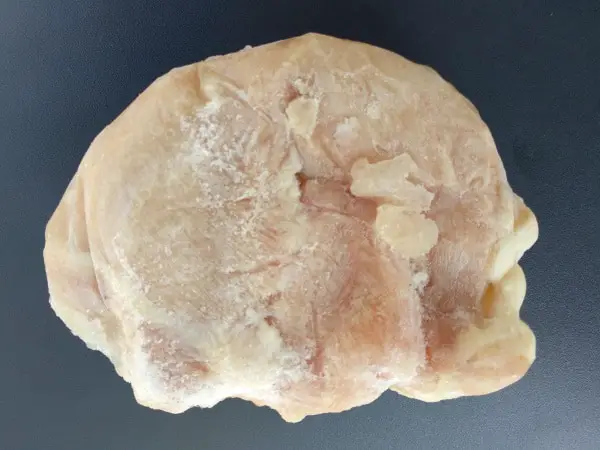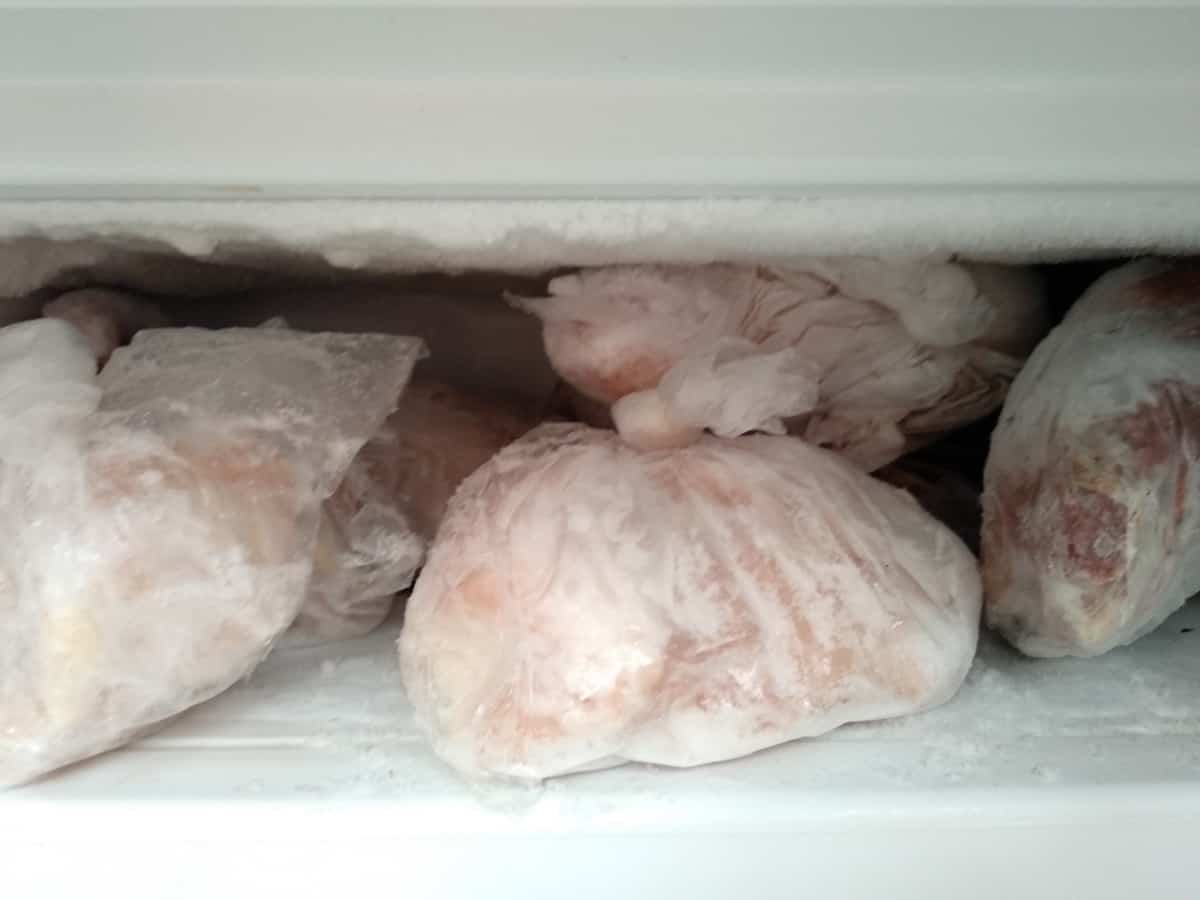According to the Food and Drug Administration, it is possible to freeze meat at 0 °F (-17 C); however, beef quality may drop. In addition, when frozen for extended periods, some meats may taste different when defrosted and cooked. On the other hand, some meats are not affected by freezing and taste as good as they were cooked fresh from the grocery store.
Freezing meat affects the quality of most meats, which affects the taste of the meat.
Does freezing meat change the taste?
Freezing meat does affect the taste of most types of meat, especially beef. Many factors affect the taste of meat during its time in the freezer, including length in the freezer, portion sizes, and quality of meat.
Other factors may include air, water, and enzymes found in the packaging.
To lock in the taste of the meat longer, use a higher-quality beef, freeze for short periods, and maintain a temperature of 0 °F (-17 C). Additionally, freezing meat immediately upon bringing it home and removing all air from the packaging helps reduce freezer burn, which can ruin taste.
Freezing meat does not affect taste immediately, but the quality degrades over time, affecting the taste. For the best flavor from frozen meat, use it within three to four months. However, it is possible to freeze certain meats in the freezer for up to one year with little effect on the taste.
Does freezing beef change the taste?
Freezing beef does affect the taste and quality of the meat. Factors such as air, packaging, moisture, freezer temperature, and packaging impact how fast the beef degrades and how quickly the taste changes.
Freezing raw meat for a couple of months does not change the beef’s taste as much as freezing it for one year. Freezing cooked beef generally only lasts one to two months before tasting awful and being unusable.
When the beef changes color in the freezer, it does not necessarily mean the meat has gone bad; however, it might not taste the best. The meat is okay to cook and eat as long as there is no mold, smell, or odor; otherwise, toss it immediately. Additionally, throw the meat away immediately if it is slimy or slippery.
ESSENTIAL TOOLS AND EQUIPMENT FOR FREEZING FOOD
Last update on 2025-06-15 / Affiliate links / Images from Amazon Product Advertising API
Why does frozen beef taste different?
Frozen beef tastes differently because the meat has enzymes activated when exposed to too much moisture and cold air. When activated, the enzymes deteriorate the beef’s taste. The longer beef is frozen, the greater the taste is affected through these activated enzymes.
Moisture and air also affect the taste of the beef when they react with one another, forming crystals in the meat affecting the molecular structure of the meat. These crystals signify the beginning stages of freezer burn, which is the most significant factor affecting the quality and taste of beef.
Additionally, when beef is frozen, the water cells within the meat expand and rupture cells. Then when defrosted, liquid in the beef is lost, sometimes causing the meat to get flaky. Loss of liquid, including blood, affects the juiciness and flavor of the meat.
Keep the freezer clean and ensure the meat is adequately sealed before freezing. If not clean, improperly sealed meat can absorb odors from other items in the freezer, which also affects the taste.
Do frozen steaks taste worse?
Frozen steaks often taste worse than fresh, unfrozen steaks. When cooking, do not take the extra step to thaw the steaks because cooking meat from a frozen state tastes better than thoroughly thawing the meat. When using this method, make sure you correctly cook the steak, so it is not frozen in the middle and burned on the outside. https://www.epicurious.com/expert-advice/how-to-cook-steak-from-frozen-article
So, leave it frozen up until the moment you are ready to cook it.
Steaks last in the freezer for a couple of months without significantly affecting the taste. Additionally, frozen steaks last for up to one year, but there is a risk of negatively affecting the meat’s flavor.
Does freezing ground beef change the taste?
Freezing ground beef dehydrates the meat, which negatively affects the taste and texture. Yeast and bacteria growth slow down when freezing ground beef; however, sharp crystals from escaping moisture cause the composition of the meat to break down.
As fibers break down, the natural flavor of the ground beef escapes when thawed, which affects the overall taste of the meat.
Do not freeze ground beef any longer than three to four months. Any longer significantly increases the chance of the taste degrading and freezer burn to start developing.
Does freezing bacon change the taste?
If handled properly and kept at 0 °F, freezing bacon does not affect its taste. Frozen bacon that is not freezer burned tastes the same as if you used a fresh, unfrozen package. However, if freezer burn has set in, the bacon will not taste good. Bacon will last in the freezer for up to six months before being at risk of developing freezer burn.
Does freezing ham change the taste?
Freezing ham does not affect the taste. Frozen ham tastes precisely the same as it would if you were eating fresh, unfrozen ham. Uncooked uncured ham lasts up to six months in the freezer, and cooked ham lasts about three to four months when frozen. Spiral cut hams and leftovers last up to two months in the freezer.
Does freezing fish change the taste?
Freezing fish does not affect the quality or taste. Freezing fish early, such as on the fishing boat, is the best way to preserve the taste of fish, especially salmon. Freezing kills any bacteria or organisms in fish, making them safe for raw and cooked consumption.
To even the most refined palates, distinguishing between frozen and unfrozen salmon is near impossible. Freezing fish preserved the oils and fats within the salmon and other fish meats necessary for great-tasting seafood. As long as the fish meat remains frost-free, freezing does not affect the taste.
Does freezing chicken ch ange the taste?
ange the taste?
Freezing raw chicken does not significantly affect the taste when appropriately packaged and frozen for only a couple of months. However, the longer chicken remains in the freezer, the greater the chance of the taste degrading. Therefore, freezing raw chicken is best when used in two to three months but can remain frozen for as long as one year.
How to make frozen meat taste better
There are several things to do before freezing and after thawing to help make the meat taste better. Some professional chefs suggest soaking meat in a salty, ice-cold bath, which locks the nutrients in the meat before freezing and helps preserve the meat’s flavor.
Other things you can do before freezing include removing bones and trimming the fat.
Another method to help make frozen meat taste better is to season the meat with dry ground herbs and salt before freezing it. The salt extracts excess moisture, and the herbs retain and add flavor.
When defrosting meat, soak the meat in balsamic vinegar. The meat absorbs the vinegar as it defrosts, which returns moisture and flavor to the meat. Keep the meat in the vinegar until it’s ready to cook.
Meats that may not taste the same after being placed in the freezer work great in soups, stews, and recipes where the meat is not the primary ingredient. When cooking meals with other flavorful ingredients, meats tend to taste better.
Does thawing meat affect the taste?
Thawing meat does not affect the taste as much as freezing it does. Properly thawed meat reduces bacteria growth, which also affects the taste of meats. The best method to thaw meat is in the refrigerator, but you need to place it on the bottom shelf on a plate as not to contaminate other products in there.
Defrosting meat on the counter risks part of the meat defrosting faster than the rest. In addition, defrosting meat on the counter could promote bacteria growth, which is unhealthy and affects the taste.
It is better to defrost the meat submerged in a sink full of lukewarm water and either cook immediately after the meat is defrosted or placed in the refrigerator.
Using the microwave to defrost meat often affects the taste. Meat’s flavor is affected because the microwave sometimes does not evenly thaw meat out, and some areas start to cook. Microwaving meat changes the structure and texture of the meat, which affects the taste. Additionally, the microwave dries out meat, eliminating the many juices and water needed to preserve the flavor.
Conclusion
In most cases, freezing meat does affect the overall quality and taste. To ensure the best quality and flavor, only keep the meat in the freezer for a few months at most. Otherwise, you may notice the meat not tasting as well as you expected.







